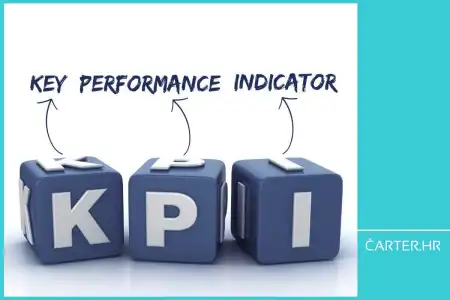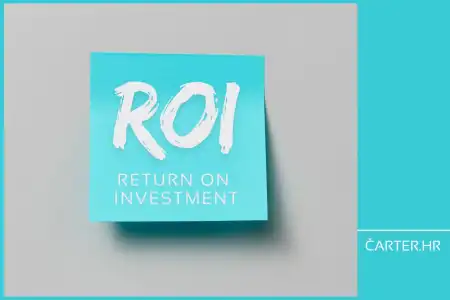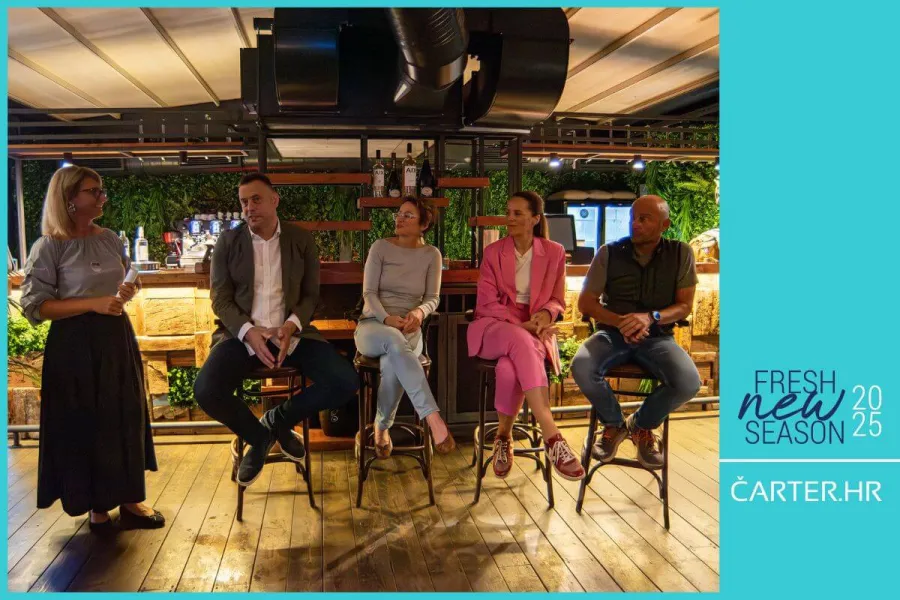
- 04.10.2024.
- News
As the nautical season draws to a close, čarter.hr organized Čarter ćakula—a relaxed gathering with a panel discussing the future of the charter industry. This event brought together familiar faces from the charter and nautical sectors, with guests including Ivica Žuro, Iva Bencun, Ivana Zec, and Vicko Ozretić. The engaging panel covered key challenges facing the industry, allowing participants to share experiences, ask questions, and enjoy open conversations. Learn how the latest Čarter ćakula went and what the future holds for the nautical sector.
With the nautical season coming to an end and results being tallied, charter.hr hosted another informal event, Čarter ćakula, while also celebrating the platform's third anniversary.
This casual event took place on October 3rd in Zadar, gathering well-known figures from the charter industry alongside some new faces from the nautical world, offering everyone a chance to unwind and connect over relaxed conversation—or "ćakula". Naturally, it all happened with the sea in the background, at the beautiful setting of Harbor CookHouse & Club in Zadar.
What was on the agenda?
The gathering began at 6:00 PM with a welcome drink, creating a great atmosphere for networking and light conversations.
Following this, participants had the opportunity to join a short panel discussion with guests on the topic: "2024: The year of truth for the charter industry - why traditional approaches are sinking, not sailing?" Various perspectives on the current state and future of the charter industry were shared, and attendees were invited to ask questions and join the discussion.
The panel was moderated by Selma Ćubara, founder of charter.hr, with panellists including:
Ivica Žuro, financial advisor and CEO of MM Beneficium
Iva Bencun, Director of the Zadar Tourist Board
Ivana Zec, certified tax advisor at UHY
Vicko Ozretić, President of the Skippers Association
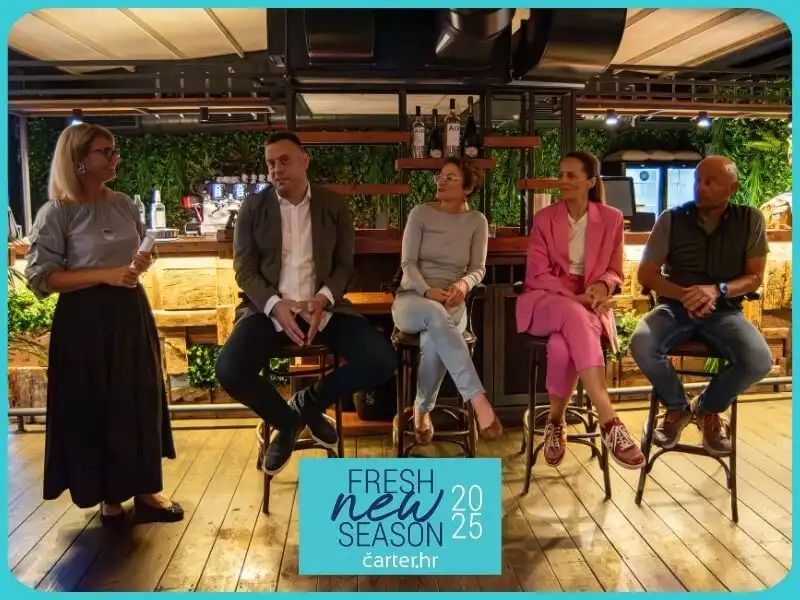
Relaxed conversation, but with serious topics
The chat touched on the current challenges facing the industry, from boat rental prices to changing guest demands.
To start the panel, Ivica Žuro commented that, from an outsider's perspective, the entire nautical industry needs better organization given the quality of its vessels and services.
Ivana Zec, speaking from her "tax" perspective, pointed out that one major issue is that anyone can provide charter services, including foreign companies that become "domestic" during the season. In other words, the existing regulations on this need to be reconsidered.
On the market, everyone sets their own prices, raising questions of fair versus unfair competition, and currently, there aren't clear rules on this matter.
There was also discussion on statistical data and the availability of information regarding how many of these foreign charter companies actually operate in Croatia in this manner, as the tax administration still needs to finalize that list. While we have data on profits from hotels and apartments, similar data for charters has yet to be compiled.
Currently, we are in the annual period when charters are preparing their price lists for the upcoming season, and there is always the question of whether there is a tax regulation on pricing or official price lists. Ivana Zec emphasized: "There is a rule that every company must have prices transparently published, and it is in every company’s interest to offer as small a discount as possible. However, market conditions ultimately dictate the price, and all discounts must be publicly declared."
After moving away from the "heavy topics," panellist Iva Bencun, Director of the Zadar Tourist Board, responded to the question of whether, for example, the city could take the initiative or organize nautical events. In other words, how is nautics viewed locally, specifically in Zadar, and is there potential to highlight the entire sector more, both in marketing and other aspects:
"Nautics, regardless of how close it actually is to us, still isn't taken very seriously. The simple reason might be that nautics 'does its own thing,' whereas private renters, for example, are much louder about their needs and demands."
It turns out that charter operators are used to managing on their own without much support from anyone. As Ivica Žuro eloquently put it, "nautics in this country is like the thirteenth piglet," suggesting it often gets overlooked.
The conclusion is that there needs to be an initiative from charter operators—a concrete initiative directed towards city and county authorities to find specific solutions.
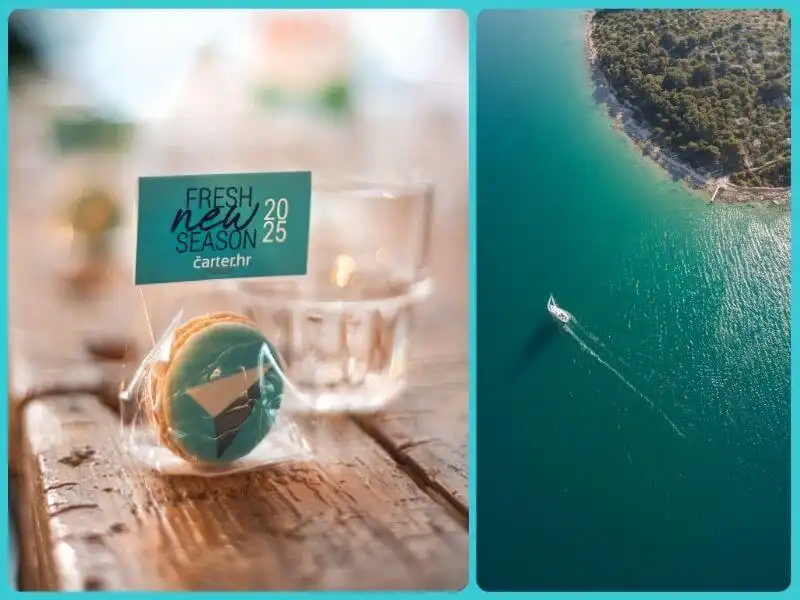
What do the statistics say?
The Zadar Tourist Board doesn't directly handle statistical data for the nautical sector, but Iva Bencun noted that e-Visitor data for this year shows excellent results for apartments and hotels, with a 24% increase in the preseason. July was down by only 2%, while August saw a 10% rise. Additionally, there has been an increase of 700 new units, which changes the equation when distributing guests...
Charter.hr, in its statistical analyses, considers official data from the e-crew system available on the MMPI website, which shows that despite an increase in the number of vessels, the number of rentals has not grown proportionally. This is something charter operators have felt acutely this season.
Consequently, if we consider a five-year period, the statistics are actually quite dire: the fleet has drastically increased, but the average number of rental weeks has dropped to around 13-14 weeks, which is completely unsustainable for charter businesses.
Ivica Žuro also commented on the ongoing tax reform, stating that it is anything but fair, and that inflation has reached as high as 50%.
From an outside perspective, it seems like there is some kind of discrimination happening, and once again, Žuro emphasized that charter operators need to be more vocal, stand up for themselves, and demand what they need for more successful operations.
We also learned that next year there will be a program for entrepreneurs, specifically around loans, and we are sure our columnist Ivica Žuro will reveal all the details when the time comes.
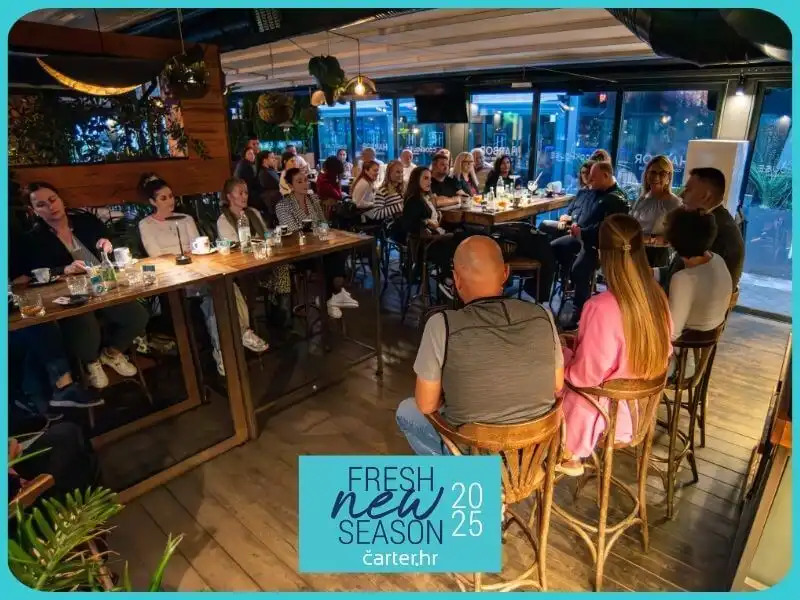
What do skippers say about charters, the past season, and education?
On the topic of the proposed contract between skippers and charter companies, Vicko Ozretić, President of the Skippers and Crew Association, stated that charter companies have slowly begun accepting this proposal.
"Charters are a bit slow on this, perhaps more burdened with financial concerns, while we skippers and crew were, until recently, treated as optional extras. And that hurts—extra equipment, spinnaker, and skipper," he said.
This attitude toward people who are supposed to be partners in the job, with a common goal of satisfying guests, reflects the position and treatment of skippers by some charter companies.
The discussion continued about the importance of staff training—skippers, sailors, and technicians—in the charter industry, since they are the first point of contact with guests, and this contact is crucial.
Lack of training leads to situations where people at sea no longer help each other but instead record others' mishaps for social media.
Vicko Ozretić added that these modern tourists are often quite rude, coming to the sea without any training, not even basic knowledge, and showing no respect towards other boaters.
He also noted that problematic guests are quite rare, but it all depends on the approach of skippers and all employees at the charter base.
As the Skippers Association is one of the driving forces behind the initiative to change the rules on education in nautical professions, Vicko said: "At first, everyone was euphoric, but the working group that was formed encountered bureaucracy, and for three years now, many work hours have been spent trying to create a unified license that would be recognized everywhere. Unfortunately, nothing has come of it yet, despite us being known as a leading nautical power."
The issue of price and quality in Croatian charter
Among the many topics that emerged during our Čarter ćakula, one, in particular, sparked a heated discussion—the balance between price and quality in Croatian charters. As is often the case when a group of people passionate about nautical tourism gathers, this discussion couldn’t pass without varied perspectives and a few sighs.
The conclusion was that we are a nautical destination lacking a balance between service price and quality and that we have commercialized everything we could.
Maybe the solution lies in limiting the number of vessels or better-regulating prices, but perhaps that’s a topic for another meeting.
Further, the discussion focused on how the quality of our fleet compares, and why, in the end, prices do not match the quality but instead keep dropping. Because, as any reasonable person would think, if something is cheaper, it’s assumed to be of lower quality.
It was debated that it's not good to lack reciprocity, and maybe "less is more" applies here as well. We should focus on both quality and price. After all, the goal isn’t to have the largest fleet in the Mediterranean if half of our guests are dissatisfied.
And just when it seemed like we were going in circles on this topic, our financial guru Ivica Žuro brought the discussion to a close with the comment—"Not every misfortune is truly bad, you just need to endure." This moment of wisdom brought smiles to everyone’s faces. Because if there's one thing we are truly good at, it's endurance.
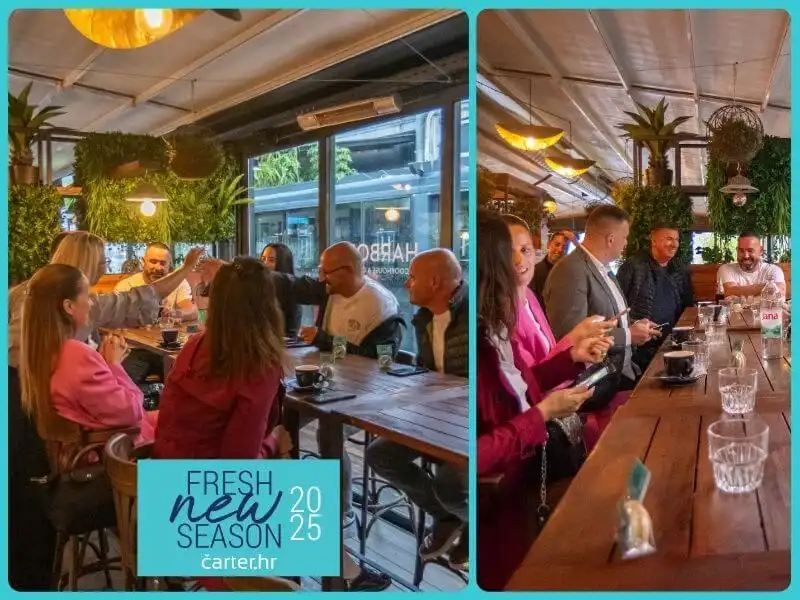
Čarter ćakula - an opportunity for a break and informal networking
Although the numbers were serious and the topics even more so, this Čarter ćakula once again proved that the strength of our industry lies in the people behind it. The panel discussion raised many important issues, from the challenges of a saturated market to the need for modernizing marketing approaches and staff education. But aside from the serious topics, the emphasis was on relaxed socializing, and at the end of the panel, everyone had the opportunity to ask questions of the panellists.
In a friendly atmosphere, through the exchange of experiences and a lot of informal networking that allowed for connections beyond usual business frameworks, we concluded yet another Čarter ćakula.
While some shared their successes, others spoke openly about their challenges. With the fact that 82.8% of our fleet consists of smaller boats, it became clear that we need to think about diversification and innovation. This event provided exactly what everyone needed before the nautical season officially closed and the boat show season begins in full swing.
Categories of trends
- News
- Sale
- Marketing
- SEO
- Web design
- Social media
- Technology
- Regulations
- Management
- Education
- Finances
- User experience
Newsletter
Sign up for the newsletter and receive the latest trends and tips straight to your inbox


